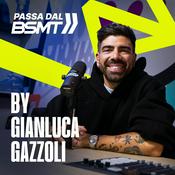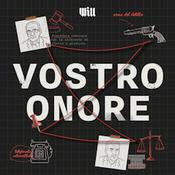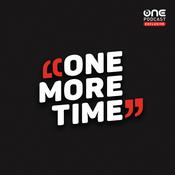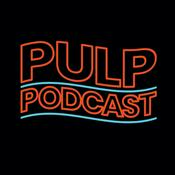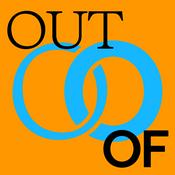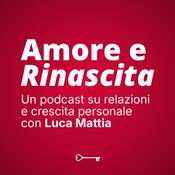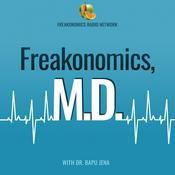885 episodi
- For 50 years, the healthcare industry has been trying (and failing) to harness the power of artificial intelligence. It may finally be ready for prime time. What will this mean for human doctors — and the rest of us? (Part four of “The Freakonomics Radio Guide to Getting Better.”)
SOURCES:Bob Wachter, professor, chair of the department of medicine at the University of California, San Francisco.
Pierre Elias, cardiologist, assistant professor of biomedical informatics at Columbia University, medical director for artificial intelligence at NewYork-Presbyterian Hospital.
RESOURCES:A Giant Leap: How AI Is Transforming Healthcare and What That Means for Our Future, by Bob Wachter (2026).
"Epic Systems (MyChart)," by Acquired (2025).
"Detecting structural heart disease from electrocardiograms using AI," by Pierre Elias and Timothy Poterucha (Nature, 2025).
"What Are the Risks of Sharing Medical Records With ChatGPT?" by Maggie Astor (New York Times, 2025).
"Will Generative Artificial Intelligence Deliver on Its Promise in Health Care?" by Bob Wachter and Erik Brynjolfsson (JAMA, 2023).
The Digital Doctor: Hope, Hype, and Harm at the Dawn of Medicine’s Computer Age, by Bob Wachter (2015).
EXTRAS:"The Doctor Won’t See You Now," by Freakonomics Radio (2025).
"How to Stop Worrying and Love the Robot Apocalypse (Update)," by Freakonomics Radio (2024).
Hosted by Simplecast, an AdsWizz company. See pcm.adswizz.com for information about our collection and use of personal data for advertising. - Zeke Emanuel (a physician, medical ethicist, and policy wonk) has some different ideas for how to lead a healthy and meaningful life. It starts with ice cream. (Part three of “The Freakonomics Radio Guide to Getting Better.”)
SOURCES:Zeke Emanuel, oncologist, bioethicist, professor at the University of Pennsylvania.
RESOURCES:Eat Your Ice Cream: Six Simple Rules for a Long and Healthy Life, by Zeke Emanuel (2026).
"Nutrition Science’s Most Preposterous Result," by David Merritt Johns (The Atlantic, 2023).
EXTRAS:"Is Ozempic as Magical as It Sounds?" by Freakonomics Radio (2024).
"The Suddenly Diplomatic Rahm Emanuel," by Freakonomics Radio (2023).
"Ari Emanuel Is Never Indifferent," by Freakonomics Radio (2023).
"What’s the “Best” Exercise?" by Freakonomics Radio (2014).
Hosted by Simplecast, an AdsWizz company. See pcm.adswizz.com for information about our collection and use of personal data for advertising. - After five years, Levitt is ending People I (Mostly) Admire, and will start hosting the occasional Freakonomics Radio episode. We couldn’t be happier.
SOURCES:Steve Levitt, co-author of Freakonomics and host of People I (Mostly) Admire.
RESOURCES:"How to Help Kids Succeed," by People I (Mostly) Admire (2025).
"Feeling Sound and Hearing Color," by People I (Mostly) Admire (2024).
"Richard Dawkins on God, Genes, and Murderous Baby Cuckoos," by People I (Mostly) Admire (2024).
"Arnold Schwarzenegger Has Some Advice for You," by People I (Mostly) Admire (2024).
"Drawing from Life (and Death)," by People I (Mostly) Admire (2023).
"Yuval Noah Harari Thinks Life is Meaningless and Amazing," by People I (Mostly) Admire (2022).
"Is This the Future of High School?," by People I (Mostly) Admire (2022).
"Does Death Have to Be a Death Sentence?," by People I (Mostly) Admire (2022).
"Sal Khan: 'If It Works for 15 Cousins, It Could Work for a Billion People.'" by People I (Mostly) Admire (2021).
"Jared Diamond on the Downfall of Civilizations — and His Optimism for Ours," by People I (Mostly) Admire (2021).
"Amanda & Lily Levitt Share What It’s Like to be Steve’s Daughters," by People I (Mostly) Admire (2021).
"How Rahm Emanuel Would Run the World," by Freakonomics Radio (2020).
The Levitt Lab.
Hosted by Simplecast, an AdsWizz company. See pcm.adswizz.com for information about our collection and use of personal data for advertising. - It regulates 20 percent of the U.S. economy, and its commissioner has an aggressive agenda — faster drug approvals, healthier food, cures for diabetes and cancer. How much can he deliver? (Part two of “The Freakonomics Radio Guide to Getting Better.”)
SOURCES:Marty Makary, commissioner of the Food and Drug Administration.
RESOURCES:"Clinical Trials Affected by Research Grant Terminations at the National Institutes of Health," by Vishal Patel, Michael Liu, and Anupam Jena (JAMA Internal Medicine, 2025).
"What the evidence tells us about Tylenol, leucovorin, and autism," by Matthew Herper (STAT, 2025).
"I Run the F.D.A. Pharma Ads Are Hurting Americans." by Marty Makary (New York Times, 2025).
Blind Spots: When Medicine Gets It Wrong, and What It Means for Our Health, by Marty Makary (2024).
EXTRAS:"Are You Really Allergic to Penicillin?" by Freakonomics Radio (2025).
"How to Fix the Hot Mess of U.S. Healthcare," by Freakonomics Radio (2021).
"Bad Medicine, Part 3: Death by Diagnosis," by Freakonomics Radio (2016).
Hosted by Simplecast, an AdsWizz company. See pcm.adswizz.com for information about our collection and use of personal data for advertising. - We all want to stay sharp, and forestall the cognitive effects of aging. But do brain supplements actually work? Are they safe? And why doesn’t the F.D.A. even know what’s in them? (Part one of “The Freakonomics Radio Guide to Getting Better.”)
SOURCES:Marty Makary, commissioner of the Food and Drug Administration.
Peter Attia, physician, author, and host of The Peter Attia Drive.
Pieter Cohen, associate professor of medicine at Harvard Medical School, physician at the Cambridge Health Alliance.
RESOURCES:"Protein Powders and Shakes Contain High Levels of Lead," by Paris Martineau (Consumer Reports, 2025).
"Accuracy of Labeling of Galantamine Generic Drugs and Dietary Supplements," by Pieter Cohen, Bram Jacobs, Koenraad Van Hoorde, and Céline Vanhee (JAMA, 2024).
Blind Spots: When Medicine Gets It Wrong, and What It Means for Our Health, by Marty Makary (2024).
Outlive: The Science and Art of Longevity, by Petter Attia (2023).
"Revealing the hidden dangers of dietary supplements," by Jennifer Couzin-Frankel (Science, 2015).
EXTRAS:"China Is Run by Engineers. America Is Run by Lawyers." by Freakonomics Radio (2025).
"How to Fix the Hot Mess of U.S. Healthcare," by Freakonomics Radio (2021).
Hosted by Simplecast, an AdsWizz company. See pcm.adswizz.com for information about our collection and use of personal data for advertising.
Altri podcast di Cultura e società
Podcast di tendenza in Cultura e società
Su Freakonomics Radio
Freakonomics co-author Stephen J. Dubner uncovers the hidden side of everything. Why is it safer to fly in an airplane than drive a car? How do we decide whom to marry? Why is the media so full of bad news? Also: things you never knew you wanted to know about wolves, bananas, pollution, search engines, and the quirks of human behavior.
To get every show in the Freakonomics Radio Network without ads and a monthly bonus episode of Freakonomics Radio, start a free trial for SiriusXM Podcasts+ on Apple Podcasts or by visiting siriusxm.com/podcastsplus.
Sito web del podcastAscolta Freakonomics Radio, Cenni storici per fare lo splendido e molti altri podcast da tutto il mondo con l’applicazione di radio.it
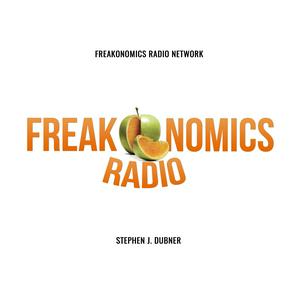
Scarica l'app gratuita radio.it
- Salva le radio e i podcast favoriti
- Streaming via Wi-Fi o Bluetooth
- Supporta Carplay & Android Auto
- Molte altre funzioni dell'app
Scarica l'app gratuita radio.it
- Salva le radio e i podcast favoriti
- Streaming via Wi-Fi o Bluetooth
- Supporta Carplay & Android Auto
- Molte altre funzioni dell'app


Freakonomics Radio
Scansione il codice,
scarica l'app,
ascolta.
scarica l'app,
ascolta.



